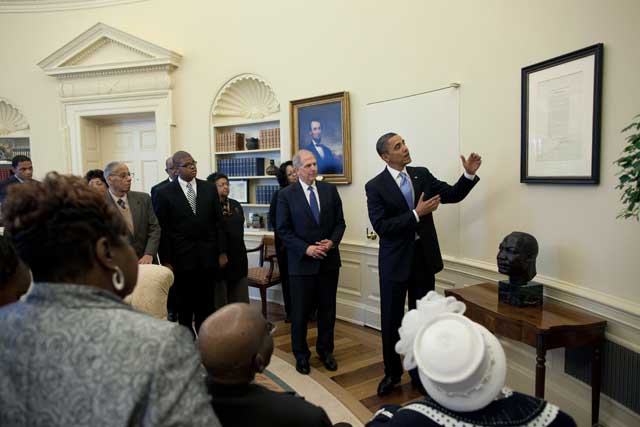
This past June, while the sputtering economy, seemingly bottomless oil spill and the war in Afghanistan dominated headlines, a distinguished “visitor” departed the White House after five quiet months in residence.
Too few people ever realized the Emancipation Proclamation had returned to the place where it was written: that is, an autographed, limited-edition presentation copy of the proclamation. (The original handwritten version perished in the Great Chicago Fire of 1871 and the official “engrossed” copy resides at the National Archives.) Lent by mogul David Rubenstein, the White House version was hardly unique. It is one of 48 reproductions signed by Abraham Lincoln and sold for $10 apiece to raise funds for Union soldiers. But it was rare enough to excite President Obama’s interest.
Though it was planned for display in the Lincoln Bedroom—site of the second-floor office where Lincoln wrote the original—Obama elected to move it to “the Oval” so he could show it to visiting dignitaries. On Martin Luther King Day, he showed it to a delegation of civil rights elders, linking the order of 1863 to King’s “I Have a Dream” speech of 1963.
White House aide Michael Strautmanis undoubtedly spoke for many when he observed that the exhibit was a “powerful reminder of how far the country has come.” Ignored was the fact that Lincoln wrote the proclamation in leaden prose crafted to survive court challenges rather than inspire the public. He said little about it at all, in fact, until journeying to Gettysburg in November 1863. There he asserted that the nation required this “new birth of freedom,” noting its original promise of equality remained an “unfinished work.” Seven score and seven years later, an African American and the document that gave African Americans their freedom were together occupying a White House that, when Lincoln first arrived, was off limits even to black servants.
“This must be the Lord’s doing be-cause we’ve come a mighty long way,” an emotional 102-year-old visitor named Mabel Harvey told Obama when she got to glimpse the document.
In truth, more journalists covered the proclamation’s departure than its arrival, but once again, as he has done so often since first announcing his presidential candidacy outside the Illinois shrine where Lincoln warned of a “House Divided” in 1858, Obama had aligned himself with Lincoln: as the living embodiment of the struggle to complete his “unfinished work.”
But while Obama channeled Lincoln at his victory speech on Election Night (“we must not be enemies”), later retraced the last lap of Lincoln’s inaugural journey and took his oath of office on the Bible Lincoln used at his own swearing-in, more recent efforts have faltered. Reminders—to Congress and critics—that the “better angels” of our nature ought to prevail in tough times have fallen on deaf ears. And when the president chose to spend Memorial Day speaking at the Abraham Lincoln National Cemetery in Chicago, some veterans complained that in bypassing the traditional wreath-laying at Arlington National Cemetery, he was only seeking an excuse for a long holiday weekend in his hometown.
Obama gamely began that speech by praising those who “saved the Union” and urging their descendants to “never stop working to perfect it.” But then a violent thunderstorm struck, and from beneath a hastily opened umbrella, the president replaced Lincolnian oratory with traffic control, urging people to get out of harm’s way. If Mabel Harvey had been in attendance, would she have commented that the Lord was again working in mysterious ways? Perhaps.
For a time, anyway, Lincoln receded from the White House vocabulary. The protracted recession seemed to call for the bold experimentation of FDR. The threat to the Gulf invited the aggressive environmentalism of Teddy Roosevelt. And some sages urged Obama to ramp up the emotionalism once perfected by Bill Clinton. Lincolnphiles—some of whom had criticized Obama’s appropriation of Lincoln—now lamented the president’s reliance on other inspirations.
But when push came to shove, Obama showed again why Lincoln remains his guiding star, and not only on issues of race. General Stanley McChrystal’s summer meltdown may have summoned comparisons to Douglas MacArthur’s Korean War–era insubordination and Harry Truman’s brave decision to sack him. But the circumstances also called to mind Lincoln and the Civil War.
Lincoln was beset by incorrigible generals—more than once. George B. McClellan referred to the president as a “gorrilla” [sic] and insubordinately told him that Federal troops would fight only to save the Union, not to destroy slavery. Lincoln craftily kept McClellan in command just long enough to win the Battle of Antietam, which ironically emboldened Lincoln to announce emancipation. Afterward, the general developed “the slows.” Enter liberty and exit McClellan.
Then there was the case of one of McClellan’s successors, Joseph Hooker. When “Fighting Joe” took command following the embarrassing Union disaster at Fredericksburg, the general brazenly suggested that what the country really needed was a dictator. Lincoln calmly urged him to win victories, leaving worries about dictatorships to the president. After Hooker was defeated at Chancellorsville in May 1863, Lincoln dumped him, too—not to mention John Pope, Irvin McDowell, Ambrose Burnside, John C. Frémont and others just as experienced.
When generals win, they can say just about anything (remember Patton?). When they falter, even briefly, like McClellan and McChrystal, a foot-in-the-mouth can elicit the boot—while concurrently, and usefully, solidifying a civilian president’s own command credentials.
Here is a Lincoln lesson Obama has evidently learned. Perhaps the comparison is imprecise. But so is history. Time will tell whether McChrystal’s successor, David Petraeus, proves himself another Burnside or another Ulysses S. Grant. And, in turn, whether or not Obama is another Lincoln, in substance as well as symbol.
Award-winning author Harold Holzer served as co-chairman of the U.S. Lincoln Bicentennial Commission.
Article originally published in November 2010 America’s Civil War.




